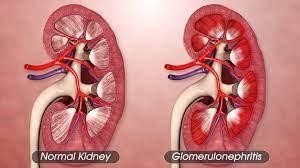A client with glomerulonephritis is preparing for discharge and asks the nurse which kind of diet to follow upon returning home. Which dietary teaching should the nurse include in the discharge instructions?
Follow low carbohydrate diet with low glycaemic index foods.
Eat a high protein diet three times a day.
Avoid foods high in potassium.
Restrict sodium rich foods and excessive oral fluids.
The Correct Answer is C
Choice A
Following low carbohydrate diet with low glycaemic index foods is incorrect. This recommendation is not specifically related to the management of glomerulonephritis. While managing carbohydrate intake might be relevant for individuals with diabetes, it's not the primary focus for someone with kidney inflammation.
Choice B
Eating a high protein diet three times a day is incorrect: While protein is important for overall health and recovery, a high protein diet might not be the best recommendation for someone with compromised kidney function. Excessive protein intake could potentially put additional strain on the kidneys.
Choice C
Avoiding foods high in potassium is correct. Examples of foods high in potassium that the client should be cautious about include bananas, oranges, potatoes, tomatoes, spinach, and other fruits and vegetables. Glomerulonephritis is a condition involving inflammation of the glomeruli in the kidneys, which can affect kidney function and the regulation of electrolytes, including potassium. In glomerulonephritis, the kidneys might have difficulty filtering and excreting excess potassium, leading to a potential build-up of potassium in the blood (hyperkalaemia).
Choice D
Restricting sodium rich foods and excessive oral fluids is incorrect. This recommendation aligns more closely with managing fluid retention and blood pressure, which can be relevant for individuals with kidney issues. However, the primary concern in glomerulonephritis is often potassium balance, making the recommendation to avoid high potassium foods more pertinent.

Nursing Test Bank
Naxlex Comprehensive Predictor Exams
Related Questions
Correct Answer is B
Explanation
Choice A
Canned cream of mushroom soup, tuna salad, and water is inappropriate. Canned soups and processed foods like canned cream soups can be high in sodium. Tuna salad might also have added salt.
Choice B
B. Bacon, lettuce, and tomato sandwich, grapes, and skim milk is the appropriate selection. A serum sodium level of 155 mEq/L (155 mmol/L) is higher than the normal reference range (136 to 145 mEq/L or 136 to 145 mmol/L), indicating hypernatremia or high blood sodium levels. In this case, it's important for the client to choose foods that are lower in sodium to help manage their sodium intake.
Choice C
Taco salad, refried beans, low-fat ice cream, and coffee is inappropriate. Taco salad can contain salty ingredients, and refried beans can also be high in sodium. Processed meats and sauces used in tacos can contribute to sodium intake.
Choice D
Chicken salad on toast, fruit-flavoured yogurt, and iced tea is inappropriate. Chicken salad and some breads might contain added salt. Fruit-flavoured yogurts can also have added sugars, and iced tea can vary in sodium content depending on how it's prepared.
Correct Answer is ["A","B","D","E"]
Explanation
Choice A rationale: St. John's Wort is an herbal supplement that can interact with various medications, including insulin, and may alter blood glucose levels. It can reduce the effectiveness of insulin, leading to decreased blood glucose control. It is essential for the client to inform the healthcare provider about any use of St. John's Wort to adjust the insulin regimen accordingly.
Choice B rationale: Corticosteroids can increase blood glucose levels by promoting insulin resistance and inhibiting insulin action. Clients with diabetes may require adjustments in their insulin dosage while taking corticosteroids to prevent hyperglycemia.
Choice Crationale: Ibuprofen is a nonsteroidal anti-inflammatory drug (NSAID) that does not typically have a direct impact on blood glucose levels in people with diabetes.
Choice D: Oral contraceptives, specifically combination hormonal contraceptives containing estrogen and progestin, can impact blood glucose levels. They may lead to insulin resistance and, in some cases, increase blood glucose levels. The healthcare provider may need to adjust the insulin dosage for better glycemic control.
Choice E rationale: Epinephrine is a hormone that may transiently increase blood glucose levels in response to stress, but it is not a home medication that the client would be taking regularly.
Whether you are a student looking to ace your exams or a practicing nurse seeking to enhance your expertise , our nursing education contents will empower you with the confidence and competence to make a difference in the lives of patients and become a respected leader in the healthcare field.
Visit Naxlex, invest in your future and unlock endless possibilities with our unparalleled nursing education contents today
Report Wrong Answer on the Current Question
Do you disagree with the answer? If yes, what is your expected answer? Explain.
Kindly be descriptive with the issue you are facing.
